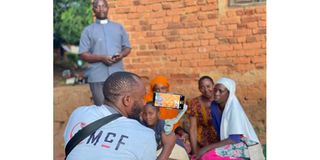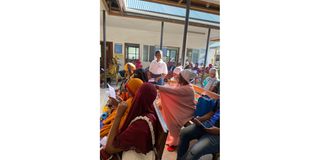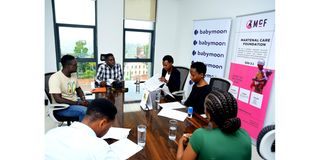McF: Advocating for community-centric approach to curb maternal deaths

Capturing powerful community stories: the McF team in action filming community voices on their experiences surrounding maternity services for the Afya Jamii video series.
With a seven-month pregnancy, an antenatal clinic categorized Mariam as being at high risk, meaning that both she and her infant were in the danger of life-threatening complications.
To her caregiver’s surprise, Mariam was visiting the antenatal clinic for the first time in her pregnancy.
Mariam was obviously full of anxiety. The caregiver was concerned, and asked her how she was feeling. Mariam said she was feeling ‘somehow’. She said that it was her first pregnancy, and for the past one month, she had not been feeling well.
The caregiver politely asked why she did not attend prenatal clinic earlier. Mariam mumbled some excuses that gave the caregiver the impression that; there was more than what Mariam was ready to divulge.
The experienced caregiver came to understand that the cultural sentiments associated with prenatal services in that community were affecting both learned and unlearned women.
Fortunately, “Mkunga Anna” came across Mariam’s case when in her normal rounds. She noted the exchanges between Mariam and her caregiver. She was neither judgmental nor surprised at Mariam’s late appearance at the clinic.
Although there have been significant infrastructural developments in maternity services over the last decade, Mkunga Anna noticed a trend that did not complement these efforts. This trend can simply be summed up as the “delay to seek care”.
From a public health perspective, this is described as a community barrier that contributes to maternal deaths – preventable maternal deaths.

McF conducts an outreach session at a health centre ad part of the Mkunga Anna Program.
Mariam, like the majority of women in her social bracket, is well educated and plugged into the digital age.
Once she suspected she was pregnant, she sought information on how she would manage herself, and what to expect from everywhere, but qualified health service providers.
The influx of informal, and actually uninformed narratives circulating in the community, and her social network led her to keep to herself and hide her pregnancy, being convinced that it is in her best interest not to “reveal her pregnancy” too soon.
She didn’t like the stories of how nauseating the supplements given at the clinic are.
Moreover, her mother didn’t attend the clinic for her, or any of her three siblings, and they all turned out fine. Her grandmother, in turn, gave birth at home to ten of her children with the help of a traditional birth attendant.
Mariam naturally assumed that her first pregnancy would go as smoothly. It is only that morning when she noticed an abnormal bleeding, after about a month of discomfort that she went to the clinic; and that too at the behest of her friends.
The nurse attending to Mariam was one of Mkunga Anna’s mentees, and was well versed and equipped to handle Mariam’s case. Mkunga Anna mentors and guides midwife nurses in the soft skills around pregnancy and maternity services.
She does not only teach conventional training on skills and practices, but also she focuses on soft skills to take a pregnant woman throughout her journey all to birth and postpartum. Mariam’s nurse did not discriminate, or speak to her with contempt of what could be perceived as negligence on her part.
Rather, she treated her with dignity, and respected her autonomy. Her privacy was of utmost importance, as Mkunga Anna stressed during their Respectful Maternity Care (RMC) class. In this continuum of care under Mkunga Anna’s mentorship, healthcare providers engage their “clients” in participatory decision-making.
At the end of this clinic appointment, Mariam leaves feeling reassured, and has a much different view of the healthcare setting than what she had anticipated. The nurse encourages her to visit with her husband on the next visit, as he plays a key role in her antenatal journey.

McF and BabyMoon come together to combat preventable mortalities in SDG 3
This positive and supportive environment in healthcare delivery for maternity service is one of the pillars of Maternal Care Foundation, otherwise known as McF.
McF is a nationally registered nonprofit organisation that works to improve health outcomes in women and children through evidence-based solutions and community engagement; complementing the government’s efforts to achieve equitable service delivery in all maternity services.
McF recognises that knowledge gaps in the community pose a hindrance to the significant strides being done by the government and partners in curbing maternal deaths.
Myths and misconceptions are surprisingly a common factor.
Efforts may focus on rural areas, creating a strange phenomenon where rural locales are more informed and educated on reproductive and maternal health, as urban populations are left to feed on the ever-growing library of misguided information online.
One small detail can mean the difference between the decisions to seek care or not, which could ultimately decide a pregnant woman’s course.
In line with this mission, over the past two years, McF has taken up this readily available digital space as a health communication platform in a bid to influence societal and behavioural practices.
A surprising insight is that men aged between 20 and 35 have more engagement in these infomercials. This tells us that the community is willing and ready to work together to improve outcomes.
“What is a community? You and I make up our community. At McF, we say “community health for global health”. Our efforts are aimed at unlocking the potential in reproductive, maternal, newborn and child health. Investment in this sphere can yield economic returns in the cost savings per life saved.

A nurse aids a new mother in using her Babymoon carrier in a supported facility.
As we are in the last mile of the Sustainable Development Goals, maternal health is an inevitable indicator that defines progress.
In light of the recent global budget cuts that are likely to affect progress in this area, grassroots organizations are in a position to strengthen the bottom-up approach.
A holistic approach to maternal health employs a continuum of care. Mkunga Anna is one of these approaches. McF also focuses on zero-budget, high-impact interventions, like health education during antenatal visits.
In one instance, McF partnered with a health centre to complement and deliver targeted knowledge and infomercials that were eagerly received.
McF is happy to partner with the government, and other partners to bridge this gap as much as possible.
In the digital arena, McF engages Mkunga Anna for public awareness and community advocacy through storytelling. Mkunga Anna is a figurative network of maternity champions such as midwives, and healthcare providers.
Mkunga Anna is not limited to physical spaces, but is also an online educational platform. She recognises that exposure does not necessarily mean the right information, and works to bridge the gap between the community and health services. This is a health system strengthening as a participatory approach.
The tri factor of community empowerment, skills/competence training and a human-centred approach hold massive potential to catapult reproductive, maternal, newborn and child health in the country to a model case across the region and continent.
As a stakeholder, who would you like Mkunga Anna to be? A nurse, a midwife, a doctor, a social worker, a paralegal, an activist, a politician or an ordinary citizen? Would you prefer to look like Mkunga Anna? Who is best positioned for this role? The possibilities for Mkunga Anna are endless… More importantly, what kind of resources will enable them to reach these goals? They are ever evolving goals as we, as a country, tick off our list on the Sustainable Development Goals.
McF acknowledges that we cannot work by ourselves. We believe in solid partnerships. In this capacity, we have had the opportunity to collaborate with government entities and other like-minded organidations.
As part of our community-based health strengthening approach, McF in the past year partnered with a village authority to raise funds for the completion of a facility construction initiated by the locals.

Through another flagship initiative, the Women’s Health Fair, we have brought together organisations under the umbrella of reproductive, maternal, newborn and child health. Moreover, we partner with Babymoon Africa.
This social enterprise develops innovative, cost-effective solutions to address real challenges in maternal and newborn health through its Little Heroes Project, which promotes Effective Kangaroo Care using assistive carriers to combat complications from prematurity.
Babymoon Africa, based in Dar es Salaam, Tanzania, is transforming infant care by creating affordable baby carriers that align with WHO recommendations and blend traditional babywearing with modern design.
In Tanzania, where newborn health faces issues like high infant mortality and limited resources, Babymoon Africa is empowering caregivers, especially for premature babies, with tools to boost survival and healthy development during the critical first 1000 days.
Their mission is to lead a global shift toward babywearing, fostering secure attachment and enhancing physical, mental, and social well-being for infants and caregivers, while building healthier families and stronger communities.
In this International Day for Maternal Health, McF advocates for a community-centric approach to maternal health to provide local solutions to local problems. On this specific day, we bring to light the dynamics around the antenatal period.
Something to note – today, Mariam and her baby are healthy and thriving. She is an avid community champion on birth preparedness. Under the tutelage of Mkunga Anna, she uses her platforms to educate on planning for a safe delivery, identifying a skilled birth attendant, choosing a health facility, saving for the big day, arranging for transport, and preparing for essential items, among others.
Thus, as we celebrate International Day for Maternal Health, we invite many more to join Mkunga Anna in her mission and support McF in this cause. To an impactful Day for Maternal Health!
You may find out more about McF through the following channels:
www.mcf.or.tz Instagram: @maternalcarefoundation Facebook: Maternal Care Foundation
+255 768 883 116/+255 759 379 848


